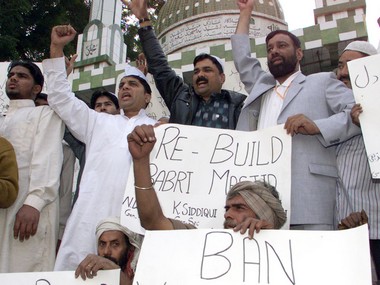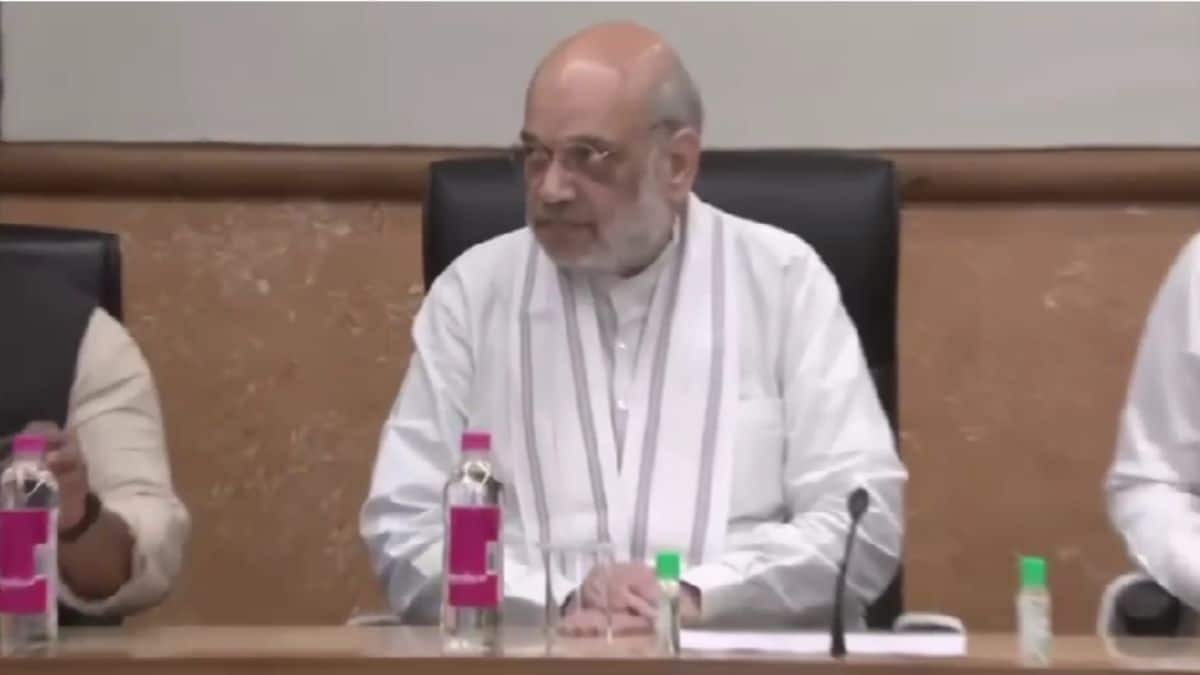The affidavit recently filed by Uttar Pradesh Shia Central Waqf Board in the Ram Janmabhoomi-Babri Masjid case has created a churn in the Muslim community. Shia Central Waqf Board chairman Wasim Rizvi, in his affidavit filed in Supreme Court, has petitioned that a mosque can be built in a Muslim-dominated area at a reasonable distance from the disputed site in Ayodhya to ensure peace. Significantly, this is a never-before move by a Muslim body which is being framed in two diametrically different fashions—a reconciliatory effort for the much-needed Hindu-Muslim harmony and a nasty bid to stir up the Shia-Sunni sectarian acrimony. [caption id=“attachment_3919641” align=“alignleft” width=“380”] Representational image. Reuters[/caption] A section of the community consisting of a few progressive Shiite and Sunni thinkers have attached significance to this ‘reconciliatory step’ as an opening of a new chapter in Hindu-Muslim harmony in India and, thus, a starting point for a negotiated settlement of the Ram Janmabhoomi-Babri Masjid dispute. Viewed from this perspective, it will certainly go down well in Indian history as a constructive development on the case that has been a flashpoint between Hindus and Muslims since 1992. The affidavit filed by the Shia Central Waqf board says: “In response to the opinion expressed by the court and considering the Muslim tenets of living in peace and harmony and respecting the religious sentiments of the Hindu community, we are ready and willing to initiate steps for a peaceful settlement of the case." But a large number of the clergymen from the two Islamic sects — Shia and Sunni — have slammed the move as a sectarian slugfest of the Shia Central Waqf Board ‘disbanded by the Uttar Pradesh government’. They call it an attempt to gain the majoritarian sympathy and, hence, do not believe it as the opinion of the whole Shiite sect in India. Thus, the Shia Central Waqf Board’s step, which appeared ‘reconciliatory’ to peace and dialogue, has been discredited by both Sunni and Shia clerics as ‘illegal and irreligious’. Surprisingly, the leading Shia clergy — members of the executive and advisory committee of Majlis-e-Ulama-e-Hind (MUH), a national outfit of Shia clergy — has issued a hard-hitting statement: “The affidavit is nothing but to create a rift between the two communities and has no religious or legal sanctions. A mosque is not owned by anyone and the board is merely its caretaker. A mosque has no Shia or Sunni character either and is for the worship of Allah. Only its caretaker can be (a) Shia or (a) Sunni,” said general secretary of MUH, Maulana Kalbe Jawad, as The Times of India reported. But a closer look at the Shia Central Waqf Board affidavit reveals that it does not merely focus on the Shia-Sunni acrimony in the Babri Masjid ownership. Rather, it mainly seeks to highlight the ’extremist’, ‘hardcore’ and ‘intolerant’ elements in the Uttar Pradesh Sunni Central Waqf Board. It reads: “It is submitted that the Uttar Pradesh Sunni Central Waqf Board is under the dominant control of Sunni hardliners, the fanatics and non-believers in peaceful co-existence, who have no stake in the present case….” On Thursday, the Uttar Pradesh Sunni Central Waqf Board’s chairman Zufar Ahmad Faruqi has strongly responded to the allegations asking the Shia Central Waqf Board to make it clear as to who it is referring to as sakhtgeer and jununi (extremist and fanatic) and “non-believers in peace”. “There is not a single person in the Uttar Pradesh Sunni Central Waqf Board who can be charged with such heinous allegations,” he averred. “The Shia Central Waqf Board is known for its false allegations against the ulema (clerics) of its own sect, let alone the Sunni outfits…there is no iota of corruption in the Uttar Pradesh Sunni Central Waqf Board which represents the Babri Masjid case in a just and fair manner," Faruqi said, as reported in the Urdu daily, Inquilab on 11 August. Not many know that that the accusation of corruption in the Uttar Pradesh Sunni Central Waqf Board first came from the mainstream Sunnis themselves. Several Sunni outfits which claim to represent 80 per cent of Sunni Muslims in India like the apex body of the Sufi-Sunni Muslims, All India Ulama and Mashaikh Board (AIUMB), have protested against the alleged corruption in the management of the Waqf property. Much before the Shia Central Waqf Board, the AIUMB held that the extremist elements systematically captured numerous mosques, mausoleums and even dargahs as they had absolute control over the state waqf boards. In October 2011, the AIUMB organised a large-scale conference titled “Muslim Maha Panchayat” in Moradabad in which it clearly stated: “The Wahabis (hardliners) have captured key Muslim institutions such as the waqf boards and the madrasas, and also wield political influence far beyond their size….The government listens only to the hardliners. It has handed over waqf properties and Masjids, which belong to us, not to them," The Hindu had
reported. An official of the AIUMB told Firstpost that the Moradabad Muslim Mahapanchayat was part of a concerted endeavour to awaken the Muslim masses about the ‘corrupt elements’ looming large in Islamic institutions particularly in the waqf property. He said that the conference tried to keep the administration and bureaucracy abreast of the fact that “after independence, Muslim representation has been hijacked by the Wahhabi hardliners in the name of Sunnis, who hardly comprise of 13 percent in the total Indian Muslim population”. Tellingly, after Moradabad conference, several similar Sunni processions were held across cities in Uttar Pradesh. They witnessed an overwhelming crowd of the Sunni population in the heartland of Uttar Pradesh in support of the demands put forward by the Sunni ulema, heads of the Sufi shrines and the Mashaikh (spiritual leaders). They urged the Indian government to mitigate the influence and control of the corrupt and fanatic elements over waqf boards being used for furthering an ’extremist agenda’ which is antithetical to the rich cultural fabric of the pluralistic Indian Islam. If the allegation of the Shia Central Waqf Board and the apex body of the Sunni-Sufi Muslims is believed to be true, it does not augur well for the Indian Muslim community’s construction, development and integrity. But interestingly, the noted Shia cleric Maulana Kalbe Jawad has reportedly pointed to ‘corruption’ within the Shia Central Waqf Board as well. He has blamed the Shia board for several contradictions in the affidavit submitted to the Supreme Court. “It is an attempt to cover up the contradictions,” Jawad said as
reported in Firstpost. In any case, the affidavit filed by the Shia Central Waqf Board which came only three days before a crucial hearing in the Supreme Court has opened the Pandora’s box. It would be interesting to note that the institution of the waqf board(s) has its origin in the British rule when many such religious institutions were created with an aim to “divide and rule”. In 1934, the Bengal Waqf Act introduced the concept of waqf boards and appointed the waqf commissioners. The sole purpose for creating the concept of waqf boards and waqf commissioners was to sow seeds of religious discord in order to extend the British Raj in India. In the early 1930s when the Gandhi-Irwin Pact was signed (1931) and third civil disobedience movement started, the British realised that they would have to leave India sooner or later. Therefore, they started implementing their plan to divide India on religious lines. Siphoning off the waqf property was one such tool. The author is a scholar of classical Islamic studies, cultural analyst and researcher in media and communication studies. He tweets as @grdehlvi
The Shia Central Waqf Board’s affidavit on Ram Janmabhoomi-Babri Masjid case, which came only three days before a crucial hearing in the Supreme Court, has opened the Pandora’s box
Advertisement
End of Article


)

)
)
)
)
)
)
)
)



